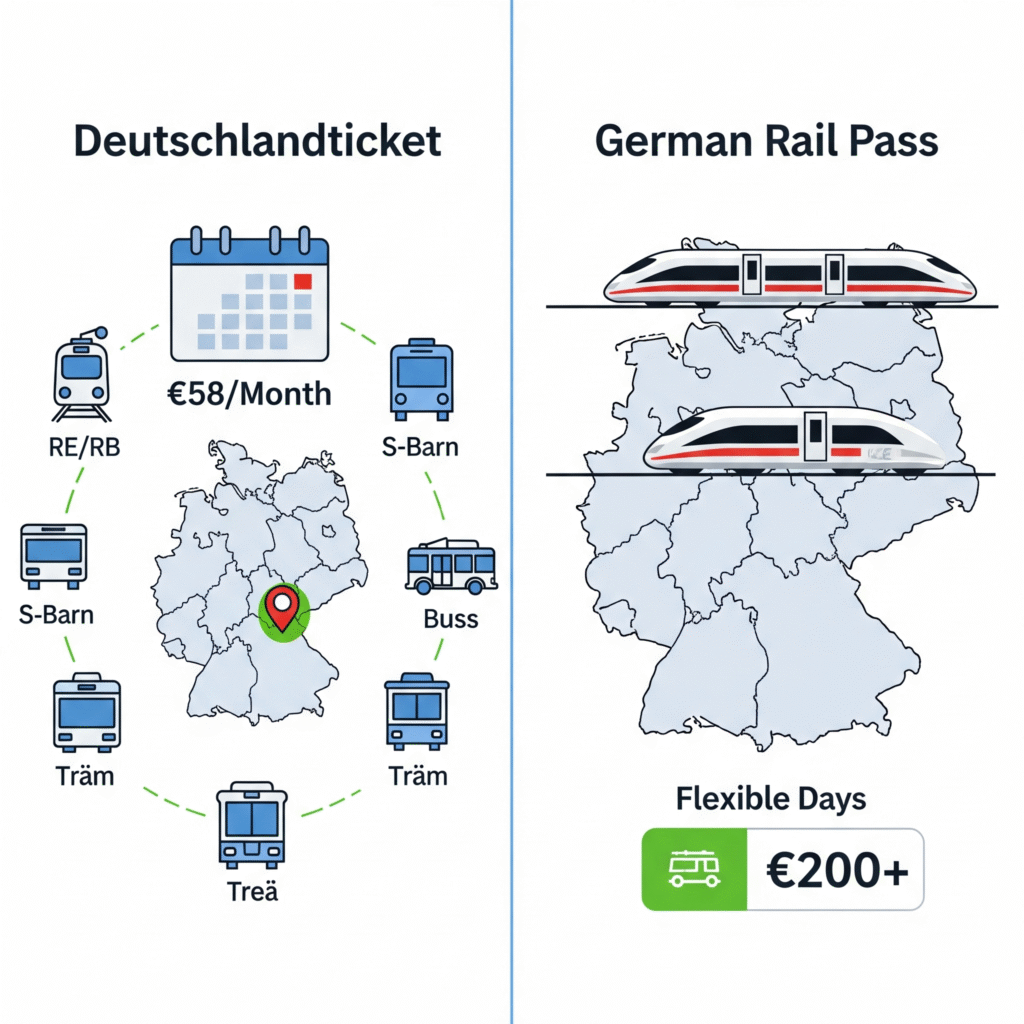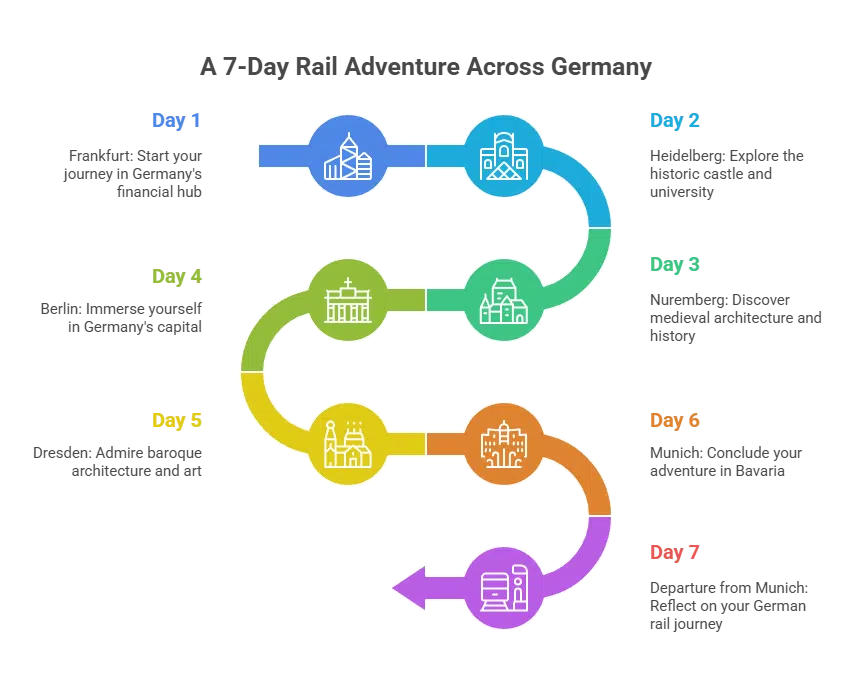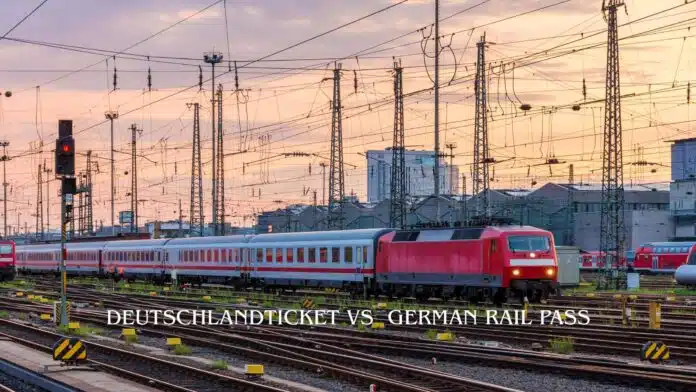
Confused by Train Tickets in Germany? You’re Not Alone.
If you’re an expat living in or moving to Germany, chances are you’ve scratched your head over the difference between the Deutschlandticket and the German Rail Pass. And you’re not the only one.
With so many travel options, and almost all of them explained in German, it’s easy to feel lost before you’ve even stepped on a train.
Here’s the short version:
- The Deutschlandticket is a €49–€59 monthly subscription for local and regional trains.
- The German Rail Pass is a flexible tourist pass that covers long-distance ICE trains across the country.
Both sound useful, but which one actually fits your life as an expat in 2025?
This guide breaks it down in plain English. Whether you’re commuting to work, planning weekend trips, or hosting visiting friends, we’ll help you choose the pass that matches your lifestyle, and your budget.
Stick around, and by the end, you’ll know which ticket is worth your euros.
Rail fares have gone up by 4.9%.
— Trades Union Congress (@The_TUC) March 4, 2024
Reminder: in Germany you can use most buses, trams and trains with a €49 monthly pass. pic.twitter.com/3jWAMcMGVi
Overview of Each Pass

Here’s a clear, side-by-side breakdown to help expats quickly understand the key differences between Germany’s two main travel passes:
Deutschlandticket vs German Rail Pass: What You Get
| Feature | Deutschlandticket | German Rail Pass |
|---|---|---|
| Coverage | Local and regional trains (RB, RE, S-Bahn) | All trains, including long-distance ICE & IC |
| Nationwide buses, trams, U-Bahn | Includes regional AND high-speed trains | |
| Best For | Daily commuters, city travel, short trips | Long-distance travel, flexible sightseeing |
| Validation Rules | Monthly subscription (valid full calendar month) | Select travel days (e.g. 4, 7, or 10 days) within 1 month |
| Pricing (2025) | €58/month (projected) | Starts at ~€200 (2nd class, 4 days); up to €400+ (1st class, 10 days) |
| Who Can Buy | Residents with German address & payment method | Non-residents, tourists, or expats with short stays |
| Where to Buy | DB Navigator app, local transit apps, station ticket machines | DB website, Eurail.com, at major stations |
Quick Tip:
If you’re only using public transport for daily life and weekend getaways within your region, the Deutschlandticket is likely enough. But if you want to zip between cities like Berlin, Munich, and Hamburg on high-speed trains, the German Rail Pass gives you that freedom, at a cost.
Keep reading to see which pass gives the best value for your specific travel style.
Which Rail Pass Fits Your Life in Germany?

Choosing a pass isn’t just about trains—it’s about how you live, move, and explore. Different expat lifestyles call for different travel needs, and here’s how each pass fits in real life.
For people who commute daily, like those who live in Berlin and work in Potsdam, the Deutschlandticket is a great option. It allows you to take the train to work in the morning and use a tram or bus later in the day. At only €58 a month, it covers all your travel needs for getting to work and running errands on the weekends. For instance, you can easily travel from Berlin’s central train station to Potsdam, or take a local trip from Kreuzberg to Mitte using the subway and bus.
If you live in Munich and enjoy short trips on weekends, the Deutschlandticket is a great choice. It allows you to travel on regional trains without incurring extra fees for reservations. You can easily take a day trip from Munich to Garmisch-Partenkirchen or explore lovely towns like Augsburg and Regensburg.
On the other hand, if you’re a long-distance traveler, say you live in Hamburg and frequently visit friends in Cologne or Munich, the German Rail Pass offers the speed and convenience you need. It includes long-distance trains, such as the ICE, which significantly reduce travel time compared to regional trains. Example journeys include Hamburg to Munich in approximately six hours, or Cologne to Berlin in just four hours.
For families touring Germany for a couple of weeks, the German Rail Pass is ideal. Traveling with kids, luggage, and a stroller can be stressful, but this pass allows you to hop between cities on flexible travel days without the hassle of booking each trip separately. It’s great for multi-city adventures where flexibility and ease are key.
Example itinerary:
- Frankfurt → Heidelberg → Nuremberg → Berlin → Dresden → Munich
- Use your 7-day pass across 2 weeks

The bottom line:
If your travel stays local, stick with the Deutschlandticket.
If you’re covering distance or touring with family, the German Rail Pass pays off.
Still unsure which fits you best? Keep reading for the price comparison.
Money-Saving Strategies for Savvy Expats
Train travel in Germany doesn’t have to break your budget, especially if you know how to mix, match, and plan ahead. Here’s how to get the most value from your pass in 2025:
Save Up to 25% with BahnCard
If you’re planning more than a couple of trips, a BahnCard can pay for itself fast. You can combine it with individual ICE tickets, or even with long-distance trips outside your Rail Pass travel days.
- BahnCard 25: 25% off all standard fares (regional + long-distance)
- BahnCard 50: 50% off standard fares (better for frequent ICE users)
- Annual cost starts around €60 for BahnCard 25 (2nd class)
Example:
Pair your Deutschlandticket with a BahnCard 25, and get 25% off a rare ICE trip from Berlin to Munich (~€130 standard fare → ~€97.50 with discount).
Deutschlandticket + Single ICE Tickets
Not ready to splurge on a full German Rail Pass? Use the Deutschlandticket for daily life and add discounted single ICE tickets only when needed. This combo works well if:
- You take long-distance trains only a few times a year
- You book early and use a BahnCard
Pro tip: ICE ticket prices are dynamic, booking 2–3 weeks ahead can save €30–€80 per trip.
Group & Family Travel: Rail Pass Wins
If you’re traveling with a partner, kids, or guests, the German Rail Pass can save serious money.
- Children under 12 often travel free with a parent or grandparent
- Twin or group passes offer lower per-person pricing
Example:
A 5-day Rail Pass for 2 adults might cost ~€400 total, cheaper than booking 5 separate ICE roundtrips per person.
Summary: Which Strategy Fits?
| Travel Style | Best Strategy |
|---|---|
| Daily regional travel | Deutschlandticket only |
| Local + occasional ICE | Deutschlandticket + BahnCard |
| Frequent long-distance | German Rail Pass + BahnCard |
| Traveling with family | Group German Rail Pass |
Up next: Let’s compare the real cost side-by-side.
How to Buy, Manage, and Cancel Each Rail Pass
Buying a rail pass in Germany doesn’t have to be a hassle, if you know where to look and what to expect. Here’s your straightforward guide to handling both the Deutschlandticket and the German Rail Pass in 2025.
Where to Buy Your Pass
Deutschlandticket (monthly subscription):
- DB Navigator app (recommended for English support)
- Local transport apps (e.g. BVG, MVV, VVS)
- Ticket machines at U-Bahn/S-Bahn stations
- Transit websites (region-specific)
German Rail Pass (flexible tourist pass):
- Deutsche Bahn’s official website
- Eurail (ideal for non-EU residents)
- In-person at large train stations in Germany
Tip: Buying online lets you track usage, store passes digitally, and avoid the language barrier at kiosks.
Managing Your Pass
The Deutschlandticket operates as a monthly subscription that automatically renews unless you cancel it. To avoid being charged for the next month, you’ll need to cancel by the 10th of the current month. You can easily manage your subscription, check validity, or cancel using transit apps like DB Navigator or your local transport provider’s app.
The German Rail Pass, on the other hand, offers more flexibility. You can choose between consecutive days or flexi-days (such as 4 travel days within one month). Each travel day can be activated directly through the app or at a ticket counter. Depending on how you purchase it, the pass may be issued in either a mobile or paper format, both of which are accepted on board.

Handling Cancellations or Refunds
You can cancel the Deutschlandticket easily through the app or on your transit provider’s website. Just remember, the cancellation only takes effect at the end of the current month, and there are no partial refunds for unused days—so it’s best to decide early.
For the German Rail Pass, refund and exchange options vary depending on where you purchased it. If you bought it from Deutsche Bahn and haven’t activated it, you can usually cancel with a small processing fee. If you bought through Eurail, you may have access to optional protection plans that offer more flexibility in case your plans change.
Pro Tip: Set It and Forget It (Safely)
- For Deutschlandticket, set a reminder on the 5th each month to decide whether to cancel
- For the Rail Pass, mark your travel days ahead of time to stay organized
Useful Links:
Coming up: Let’s break down the cost side-by-side.
Community Tips & Real-World Hacks from Expats
We’ve scoured forums, Reddit threads, and expat groups to bring you real advice from people who’ve actually used these passes. Here’s what they say works best in the wild.
Reserve Your ICE Seat, It’s Worth It
If you’re using the German Rail Pass, don’t forget: seat reservations aren’t included. That can be a surprise on busy routes like Berlin–Munich or Frankfurt–Cologne.
“My ICE was standing-room only from Berlin to Stuttgart. I paid €4.90 to reserve next time—worth every cent.” – Ali, expat from Canada
Tip: You can add a seat reservation on bahn.com or in the DB Navigator app after choosing your train. Expect to pay around €4–€6 per seat.
Buy the Deutschlandticket Early in the Month
It’s valid from the first to the last day of the calendar month, so timing matters.
“I always activate it on the 1st. One time I started on the 20th and still paid full price. Never again.” – Maria, teacher in Düsseldorf
Tip: Buy it before the month begins or within the first few days to get maximum value.
Pass Hacks: Combine Smart for Edge Cases
Sometimes the best value comes from mixing passes and tickets. Here’s what others have done:
- Use the Deutschlandticket for most of your route
- Then add a cheap extension ticket for travel just beyond the pass boundary
“I saved €50 by combining the Deutschlandticket to the edge of NRW and buying a €10 extra fare to cross into Lower Saxony.” – Ben, Erasmus student
“Deutschlandticket + €20 IC ticket to Hamburg beat the €120 full ICE price.” – Tina, freelancer in Leipzig
Look up “Anschlussfahrkarte” (add-on ticket) or check the DB app for custom fares.
Want more insider tips?
Share your experience in the comments, or ask the community which combo worked best for you!
Which Rail Pass Should You Choose?
To keep it simple:
- Deutschlandticket is perfect for daily life, regional trips, and affordable monthly mobility.
- German Rail Pass is your go-to for long-distance, high-speed travel across Germany, especially for multi-city plans or visiting friends.
There’s no one-size-fits-all answer. The best choice depends on how and where you travel in 2025.
Which pass works for you?
Are you team Deutschlandticket or German Rail Pass? Got a travel hack we missed?
Drop your questions or tips in the comments, we’d love to hear from fellow expats!
Safe travels and happy train hopping!
FAQ: Deutschlandticket vs German Rail Pass
Q1: Can I use the Deutschlandticket on ICE trains?
A: No. The Deutschlandticket only covers regional trains (S-Bahn, RB, RE), buses, trams, and U-Bahn. It does not include high-speed ICE, IC, or EC trains.
Q2: Can I use the German Rail Pass for local transport?
A: Yes, but only if the local trains are operated by Deutsche Bahn (like S-Bahn). It usually doesn’t cover city buses, U-Bahn, or trams unless bundled with a city pass.
Q3: I’m staying in Germany for 3 months. Can I use the German Rail Pass?
A: The German Rail Pass is designed for short-term visitors (tourists or non-residents). Expats with a registered German address may not qualify. If you’re living in Germany long-term, the Deutschlandticket is usually the better fit.
Q4: Are seat reservations included in either pass?
A: No. With the German Rail Pass, seat reservations for ICE/IC trains are optional but recommended, especially on weekends. Expect to pay around €4–€6 per seat. The Deutschlandticket only applies to unreserved regional trains.
Q5: Can I pause or refund the Deutschlandticket?
A: It auto-renews monthly but can be canceled anytime in your app, just make sure to cancel before the 10th of the month to avoid paying for the next month.
Q6: What happens if I get caught using the wrong pass on the wrong train?
A: Penalties can be steep. For example, using the Deutschlandticket on an ICE train without a valid long-distance ticket can result in a €60–€120 fine. Always check your train type before boarding.
Q7: Is the German Rail Pass worth it for one or two long trips?
A: Maybe not. If you’re only taking one or two ICE trips, you might save more by booking early saver fares with a BahnCard instead of buying the full Rail Pass.
Q8: Can kids travel for free with either pass?
A:
- With the Deutschlandticket, children under 6 travel free.
- With the German Rail Pass, children under 12 often travel free when accompanied by an adult, check the exact rules at purchase.

